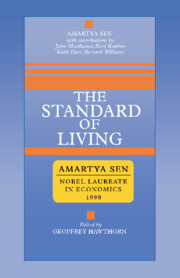Book contents
- Frontmatter
- Contents
- List of contributors
- Introduction
- The Standard of Living: Lecture I, Concepts and Critiques
- The Standard of Living: Lecture II, Lives and Capabilities
- Professor Sen on the Standard of Living
- The Standard of Living: Uncertainty, Inequality and Opportunity
- Commoditisation and the Standard of Living
- The Standard of Living: Interests and Capabilities
- Reply
- Bibliography
- Index
The Standard of Living: Interests and Capabilities
Published online by Cambridge University Press: 23 December 2009
- Frontmatter
- Contents
- List of contributors
- Introduction
- The Standard of Living: Lecture I, Concepts and Critiques
- The Standard of Living: Lecture II, Lives and Capabilities
- Professor Sen on the Standard of Living
- The Standard of Living: Uncertainty, Inequality and Opportunity
- Commoditisation and the Standard of Living
- The Standard of Living: Interests and Capabilities
- Reply
- Bibliography
- Index
Summary
I agree with a great deal of what Amartya Sen has said, particularly on the methodological principle which he has summed up by saying that it is better to be vaguely right than to be precisely wrong. I am also attracted to his major substantive conclusion — that we should think about these issues in terms of notions such as capabilities. I have some problems about what capabilities are. Some of them are problems particularly for Sen's formulations, while some of them are problems for all of us.
The first thing I want to refer to is a problem about what is meant by the expression ‘the standard of living’. I do not want to spend very long on this; it is in some part a verbal issue, but as I think Sen brings out in his lectures, there is also at least one matter of substance here. As Sen says, ‘the standard of living’ is not a term of art. It is an expression that has an antecedent use, and analysis has to be responsive to that antecedent use. But I think we have to be rather cautious in testing intuitions about what really matters in this field against the established use of this particular phrase, because it may be that this particular phrase is attached to considerations, or affected by considerations, that Sen and the rest of us might well not think central.
- Type
- Chapter
- Information
- Tanner Lectures in Human ValuesThe Standard of Living, pp. 94 - 102Publisher: Cambridge University PressPrint publication year: 1987
- 47
- Cited by

